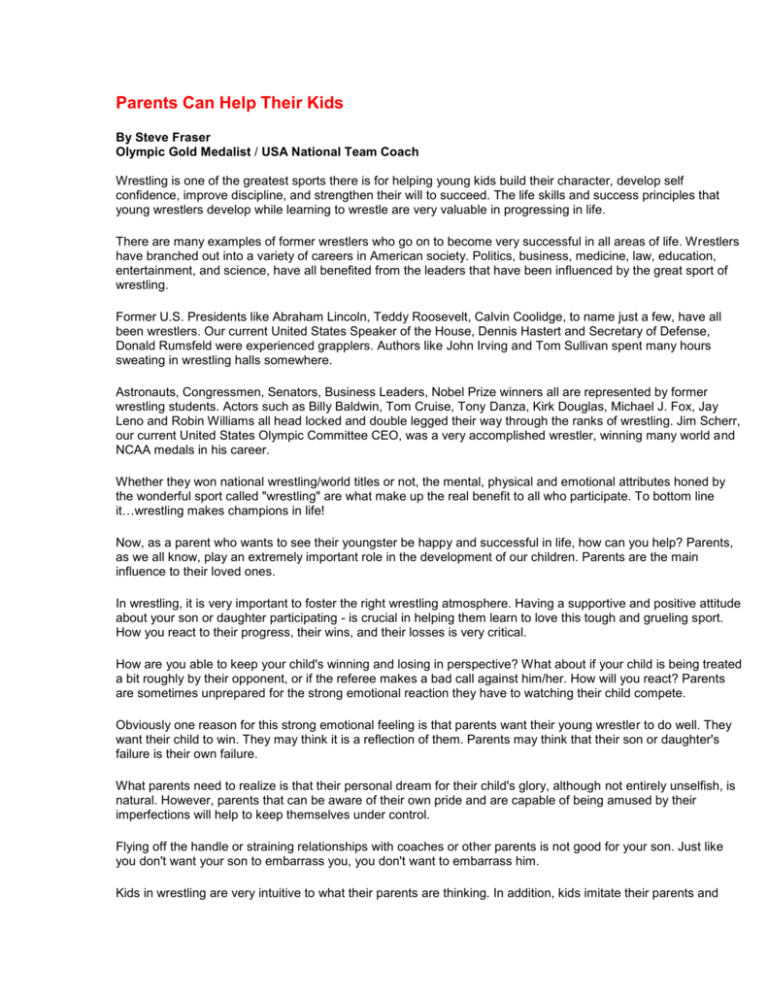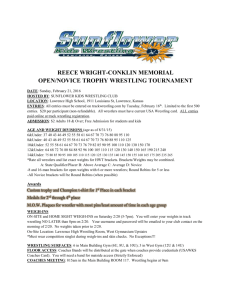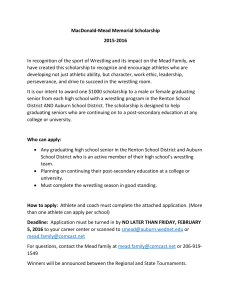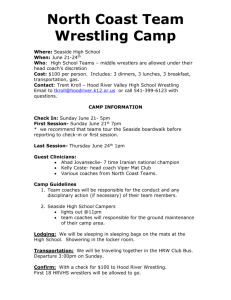Parents Can Help Their Kids
advertisement

Parents Can Help Their Kids By Steve Fraser Olympic Gold Medalist / USA National Team Coach Wrestling is one of the greatest sports there is for helping young kids build their character, develop self confidence, improve discipline, and strengthen their will to succeed. The life skills and success principles that young wrestlers develop while learning to wrestle are very valuable in progressing in life. There are many examples of former wrestlers who go on to become very successful in all areas of life. Wrestlers have branched out into a variety of careers in American society. Politics, business, medicine, law, education, entertainment, and science, have all benefited from the leaders that have been influenced by the great sport of wrestling. Former U.S. Presidents like Abraham Lincoln, Teddy Roosevelt, Calvin Coolidge, to name just a few, have all been wrestlers. Our current United States Speaker of the House, Dennis Hastert and Secretary of Defense, Donald Rumsfeld were experienced grapplers. Authors like John Irving and Tom Sullivan spent many hours sweating in wrestling halls somewhere. Astronauts, Congressmen, Senators, Business Leaders, Nobel Prize winners all are represented by former wrestling students. Actors such as Billy Baldwin, Tom Cruise, Tony Danza, Kirk Douglas, Michael J. Fox, Jay Leno and Robin Williams all head locked and double legged their way through the ranks of wrestling. Jim Scherr, our current United States Olympic Committee CEO, was a very accomplished wrestler, winning many world and NCAA medals in his career. Whether they won national wrestling/world titles or not, the mental, physical and emotional attributes honed by the wonderful sport called "wrestling" are what make up the real benefit to all who participate. To bottom line it…wrestling makes champions in life! Now, as a parent who wants to see their youngster be happy and successful in life, how can you help? Parents, as we all know, play an extremely important role in the development of our children. Parents are the main influence to their loved ones. In wrestling, it is very important to foster the right wrestling atmosphere. Having a supportive and positive attitude about your son or daughter participating - is crucial in helping them learn to love this tough and grueling sport. How you react to their progress, their wins, and their losses is very critical. How are you able to keep your child's winning and losing in perspective? What about if your child is being treated a bit roughly by their opponent, or if the referee makes a bad call against him/her. How will you react? Parents are sometimes unprepared for the strong emotional reaction they have to watching their child compete. Obviously one reason for this strong emotional feeling is that parents want their young wrestler to do well. They want their child to win. They may think it is a reflection of them. Parents may think that their son or daughter's failure is their own failure. What parents need to realize is that their personal dream for their child's glory, although not entirely unselfish, is natural. However, parents that can be aware of their own pride and are capable of being amused by their imperfections will help to keep themselves under control. Flying off the handle or straining relationships with coaches or other parents is not good for your son. Just like you don't want your son to embarrass you, you don't want to embarrass him. Kids in wrestling are very intuitive to what their parents are thinking. In addition, kids imitate their parents and absorb the attitudes that are displayed by their parent's actions. If parents are too into trying to control the coaches, referees, and other parents and are upset or angry a lot, it is hard for the young wrestler to enjoy the sport. Kids wrestling is suppose to be fun where they are focusing on the fundamentals of the sport. If kids first learn to like the act of grappling they will continue to learn the very difficult skills. Wrestling requires learning many skill sets. Technique, balance, tactics, strategies, mental toughness are all intertwined skills that must be learned before one can have great success in the sport. This takes time! Wrestling is not learned overnight. This is why, especially at a young age, it is imperative that kids stay focused on having fun and learning the basics. The winning will come later. The Parents Guide To Kids Wrestling, published by Human Kinetics Publishers, Inc., lists seven items that all parents should consider when determining where they stand as far as how they are helping their young wrestler. If you can honestly answer yes to all of the following questions then you are well on your way to helping your child in wrestling… and in life. 1. Can you give him up? That means trusting the coach in guiding your son's wrestling experience. It means accepting the coach's authority and the fact that he may be gaining some of the boy's admiration that once was directed toward you. 2. Can you admit your short comings? Sometimes we err as parents and our emotions speak before we think. We judge to quickly, only to learn we made a mistake. It takes character for parents to admit they made a mistake and to discuss it with their child. 3. Can you accept his triumphs? It sounds silly, but some parents, fathers in particular are competitive with their sons. If their boy does well in a match, the father may dwell on the minor mistakes, describe how the boy's older brother did even better, or recount how Dad did it "way back when." 4. Can you accept his disappointments? Sometimes as parents we are targets for our Childs anger and frustration. This goes along with the job. Accepting his disappointment also means watching him lose a match when his buddies are winning, or not being embarrassed into anger when he breaks out into tears after losing. 5. Can you show him self-control? The coach has a tough enough job teaching good sportsmanship to youngsters especially if the parents are losing control and showing poor sportsmanship themselves. 6. Can you give some time? Some parents are very busy and have trouble being there frequently. Probably the best solution is never promise more than you can deliver. Ask about his wrestling experiences and make every effort to watch at least some of his matches. 7. Can you let him make his own decisions? This is an essential part of a child growing up, and can sometimes be a real challenge for parents. It means offering suggestions and guidance, but finally, within limits, letting the boy go his own way. All parents have ambitions for their children, but parents must realize that they cannot mold the boy's entire life. The great thing about wrestling is that it helps your child to start making his own decisions and living with the consequences. The fact that your son or daughter is wrestling is wonderful. They are learning to work very hard, make tons of sacrifices, and dedicate themselves to the extreme demands that this tremendously difficult sport has to offer. Truly there is no tougher sport in the world. With your support and encouragement, your child will reap the many benefits gained by participating and will not only succeed in the game of wrestling, but also in the game of life. Expect To Win! Editors Note About the Author: Very unusual among U. S. wrestlers in that he competed in both freestyle and Greco-Roman, which allows holds only above the waist, Fraser competed in football, track and field, and wrestling as a high school student. He won a wrestling scholarship to the University of Michigan in 1976. Although he never won an NCAA title, Fraser continued in the sport after graduating. He won national Greco-Roman championships in the 198-pound division in 1982 and 1983, when he also won a gold medal at the Pan-American Games. Fraser won the national freestyle title in 1984 but finished second in Greco-Roman championship. However, he placed first in the 1984 Olympic trials and then became the first U. S. athlete ever to win an Olympic gold medal in Greco-Roman wrestling. Steve is the current USA Wrestling National Greco-Roman Coach for USA Wrestling.




